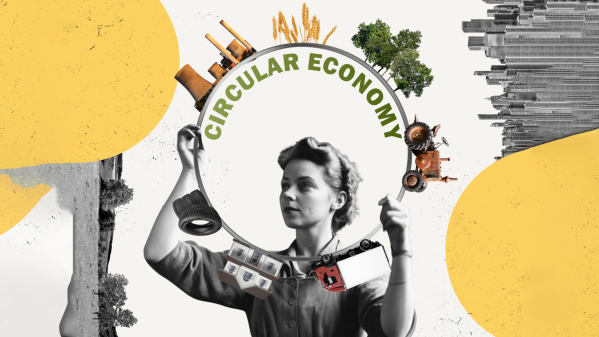In June, halfway through 2024, firms and governments assess bi-annual performance, GDP, and shareholder returns. The obsession with short-term profits and growth has led to environmental and social damage, like planned obsolescence, reckless resource extraction, and stock buybacks over long-term investments. We need alternative economic frameworks that prioritize people, the planet, and profit.
Editorial: If You Can’t Help It, Then Waste Food Responsibly
In 2023, 1.3 billion tons of food went to waste, while over 122 million faced hunger. This colossal food waste issue not only affects the environment but also represents a massive economic burden. Recycling food waste through composting and anaerobic digestion can mitigate these issues, but infrastructure and mindset hurdles need to be overcome for widespread adoption.
Closing the Loop: How Prioritizing E-Waste Recycling Can Power Climate Action
The UN report uncovers massive untapped e-waste reserves, with over 7,000 metric tons of neodymium and millions of copper and aluminium discarded annually. The demand for these critical metals is set to soar due to renewable energy and EV expansion. Transitioning to closed-loop circular models is crucial for sustainability. EU policies aim to close supply gaps.
Editorial: Universal Basic Income for a Sustainable Future
Universal Basic Income has the potential to mitigate environmental harm by reducing economic pressures that lead to overconsumption and unsustainable practices, fostering a circular economy. Challenges include funding and incentivizing sustainable choices. Despite concerns, UBI's potential for economic security and environmental sustainability merits serious consideration, and it may offer a solution to overcomsumption.
Editorial: Ocean-bound plastic poses a daunting but worthy challenge
The launch of Ocean Cleanup’s system 03 brings hope for ocean waste cleansing. The project aims to tackle the plastic pollution crisis. This ocean-bound plastic stems from inadequate waste management in coastal areas. Embracing a circular economy, it recycles ocean-bound plastic, creating economic opportunities and reducing pollution. However, challenges persist in a consumption-driven capitalist world.
From Trash to Treasure: E-waste recycling
E-waste recycling offers economic and environmental benefits by recovering precious metals and plastics from used electronics. Skilled workers carefully dismantle and process the materials, reducing new mining demands and pollution. This sustainable solution ensures valuable resources reenter supply chains, supporting green jobs and long-term climate and community health.
Editorial: Let’s Get Serious About Adopting Marine Bioplastics
Large quantities of microplastics have been found in remote marine protected areas, challenging previous assumptions about their distribution. Marine bioplastics, derived from marine organisms, offer a promising solution to plastic pollution. While challenges remain, policies and consumer awareness are vital in driving the widespread adoption of marine bioplastics and creating a more sustainable and circular economy.
Editorial: Why Do UN 2050 Goals Already Seem Fanciful?
The UN 2050 goal faces criticism from climate scientists and waste management experts for its lack of specificity, insufficient focus on circular economy principles, global inequalities, overreliance on technology, greenwashing, and the urgent need for immediate action. To address these concerns, greater transparency, collaboration, and systemic changes are essential for achieving a sustainable future.
Editorial: Does the Circular Economy Spur the Marketplace?
The circular economy aims to minimize waste and decouple economic growth from resource consumption. It focuses on prolonging product lifespan and mitigating climate change. However, challenges include balancing environmental benefits with economic goals and addressing broader environmental issues. While promising, it requires progression and refinement to fully address sustainability and economic growth.
Book Review: The Circular Economy: A User’s Guide
The Circular Economy: A User's Guide by Walter Stahel offers a clear and concise introduction to the circular economy model. In under 120 pages, Stahel contrasts it with the traditional linear approach, emphasizing waste reduction and resource efficiency. Despite some structural criticisms, the book effectively provides a foundational understanding for busy professionals.









